#but also aside from that donna and the doctor are pure magic
Explore tagged Tumblr posts
Text
partners in crime is SO fun and tbh always was
#i have such a soft spot for s4 bc i have really vivid memories of watching it with my fellow theatre nerd friends#and hanging around in the park in town on saturdays but making sure we were back for the ep#but also aside from that donna and the doctor are pure magic#she really humbles him in a way that i adore like obv she loves him they're besties but she is NOT about to tolerate any shit#i didn't post about s3 much but martha is a queen who deserved so much better and that is THAT#also votd verdict upon my first rewatch after maybe 10 yrs: is kylie really that short?????? or is david tennant just an enormous noodle??#n e way. ready to get my heart broken by this series let's go#nw rewatch
2 notes
·
View notes
Text
Ranking Companions I've Seen So Far
(Because I can)
(Purely from memory so is possible I forgot someone)
(They are bulleted instead of numbered because there's a character limit for blocks and it restarted the numbering when I broke it up. They are, however, in order from favorite to least favorite)
Sarah Jane: She hides it under professional veneer, but she is autistic chaos personified. She has the most chances of anyone to just go home, and even when she claims to be fed up she always gets back in the tardis. She is high on adventure. She thinks the Doctor has died at least once per story, and for the first 3/4 of her run they never actually get to take a fun break from constant danger, and she is hooked. She eats an orange without peeling it. She met the Doctor because she snuck into a scientific conference to investigate disappearances and then walked right into the tardis to look for him. She had no trouble believing she'd moved in space and it took only the barest evidence to have her fully on board with time travel; I think she always half believed in magic. She's excellent at bluffing but only for very short periods. She's very much about the ends justifying the means and always a little confused when people are mad since everything turned out fine, which is very Doctor of her. And their dynamic really was silly best friends.
Leela: Everyone else was either kidnapped or invited along. She pushed the Doctor aside to invite herself, because she didn't want to have to stay home and be a leader (and she too craves adventure). She never completely understands what's happening, but she jumps into every situation fully anyway. And asks a ton of questions. And, once she's been taught about something, she maintains a good understanding of it (no one in-show acknowledges how smart she is and how hard she works to catch up from not having the same education as every other character). I enjoy how ready to stab and shoot people she is, and how often she winds up with guns no matter what the Doctor says. But she's also so genuine and protective and their bickering is sweet and she's best friends with the dog even before she's left alone on Gallifrey with no one who respects her but the dog. (The whole noble savage trope is problematic but I still enjoy a great deal of her character)
Donna: She's outspoken and best friends with the Doctor and no one has ever thought he was less hot. With her the dynamic really is just we're flying through time and space playing dress up. Her fear response is indignant anger. She's a temp who has been told by her mother her whole life that she's a failure, and she's the most important person in the universe. She has terrible self esteem but never lets that get in the way of speaking her mind. She loves and supports her trans daughter. She forgot it all for 15 years and then, married with a teenager, casually moved in with her old best friend.
Bill: Even when she couldn't go to college, she was so determined to learn that she just appeared in the Doctor's lectures and was excited when she didn't initially understand things. She was his student, and his friend, and once or twice his protector, but she never did the Clara thing of putting all her time into keeping track of the Doctor and protecting him from himself. On her first alien planet, robots that spoke emoji tried to kill her, and she still kept traveling. But she never gave up her life at home or her education, either. She had a gay crush in her first episode that she never even got to go on a date with, and then ended up spending eternity together as noncorporeal beings by the end. She helped rehabilitate the most evil Time Lord. She's iconic.
Romana I: She is the sheltered excellent grades autistic. She's so baby and innocent, but also knows more about what the Doctor is talking about than any other companion (and sometimes the Doctor). She can fly the tardis, because she read the manual. She plays dress up constantly but rarely in any sort of context appropriate to where they're going. She wanted to be called Fred. She literally can't lie to save either of their lives. She's charming and beautiful and capable, but might think she's even more capable than she actually is. She was horrified by what a failure of a Time Lord the Doctor was until she realized he was happy, and that that was an option.
Yaz: I love how she seems so normal and together, got involved by chance doing her job, but slowly it becomes clear that she was never ok and somehow this was the best thing that could have happened to her. She was kidnapped into this but instead of missing home she fell in love. She gets stuck on Earth without the Doctor twice and spent both times (1) pining and (2) taking charge to save the world. She talks like she knows what to do better than any other human in the room (and often does), but still works well on a team. She ran into a kid she'd vaguely known in elementary school and his step-grandfather and then ended up traveling with them for years and becoming best friends. She should not have been a cop, however, and would have made a better social worker.
Ryan: He can't ride a bike at 19 but has yet to give up trying. It doesn't come up as much as I'd like, but he is casually disabled. He has a temper, which sort of led to him allowing a murderous alien onto Earth, but he is also so full of compassion for every random person in need they meet. He actually had a life at home and, though he stayed willingly (after getting kidnapped), he struggled with missing his friends and the normality and comfort they represented. It took running around saving worlds to make him admit he should forge a familial bond with his dead grandma's husband. He also made up with his dad (he really did the opposite arc of starting with a strong family and pulling them apart when he left). He got to leave when he chose and be safe and happy, but never stopped trying to protect his world.
Jamie: He also never understands what is happening, but he's mostly fine with that. He's just happy to be along for the ride with the Doctor, being gay and Scottish throughout time and space, ready to stab people (he would have gotten along with Leela tbh). He's good at drawing connections between things he has no context for and the closest thing he understands, and I love it because my brain does that thing too of drawing comparisons to things I've seen. If the Time Lords didn't take his memories, he would have stayed with the Doctor until eventually dying for him.
Susan: She is sensitive and autistic and not cut out for so much drama. Sure, she understands what the Doctor is talking about, and she wasn't technically kidnapped, but she was happy pretending to be a human girl in 1963 and I don't think she ever particularly wanted to keep going adventuring. But she's still enthusiastic and outgoing and just doing her best. She sort of adopted Barbara as her weird protective aunt.
Clara: She was never a normal person. She is naturally manipulative, bossy, controlling, and a bit ruthless. She didn't use most of these traits overmuch until she met the Doctor, but they were there. Luckily, she also has a fairly strong moral compass, so she isn't really a horrible person. But watching a human person surprise the Doctor by out-Doctoring him is delightful. She is also addicted to the thrill and adventure of it all, and no matter how much she likes the idea of having a normal life on the side it could never compare. I don't think she'd have survived going back to a normal human existence like Sarah had to.
Zoe: "The Doctor is almost as smart as me." She is somehow a teenager and a space librarian with a perfectly normal education level for her time that makes her a genius nearly everywhere she goes. Important to note, she is also an actual genius. She helped fend off cybermen one time and got adopted by a gay alien and his historical boyfriend, both of whom are determined to protect her but both of whom are also considerably less competent than she is. She would never have gone home if she wasn't forced to.
Martha: She is one of the most normal people on this list: a hardworking medical student with a loving but mildly dysfunctional family. Her choice of one trip in the tardis after the hospital situation is actually a pretty normal one even: who would say no to a chance to time travel? But she makes herself extraordinary through pure kindness and determination. She's so full of caring, but won't put up with people walking all over her or allow any sort of cruelty. She is one of the only ones with the strength to leave when she needs to, to take care of herself, but even so she can't forget what she knows and abandon people and quickly ends up working for UNIT and then on her own to save and protect people.
Barbara: Omg she's so weird. She's a history teacher who gets to travel through history, and is understandably delighted and horrified by this. But her response to being concerned for a student and unable to contact her family was to stalk this child to her home and then into a police box in a junkyard; it's kind of her own fault she got kidnapped, though the throughout time and space part was unpredictable. She saw an autistic alien teenager and realized no one else was going to parent her, so took that responsibility upon herself. Despite never stopping trying to get home (and eventually taking a great risk to do so), she really was delighted by so much of what they ran across. She is one of four people who know that the Doctor's manipulative curiosity is responsible for the daleks threatening the universe. She's so great.
Jo: Assigned companion because no one knew what to do with her, not even really liked by the Doctor at first, but threw her entire self enthusiastically into the job. She did not believe the Doctor could travel through time and space and really thought it was just a quirk that he was always trying to fix his time machine, but she liked him anyway. I'm not convinced she believed he was an alien, either, or knew enough about science to realize (at first) that his was more advanced than it should have been. But she was happy to help, and to learn, and just generally be along for the ride.
Liz: Thought she was too smart to be working as the Doctor's assistant, and she was right. A proper scientist who absolutely understood that his science was alien and advanced, but also how ridiculous these situations were and wasn't afraid to challenge the science that shouldn't have made sense or refuse to believe something until she saw proof. Left, of her own choice, without anything horrible happening to her; a minor miracle! Also counts as a historical queer icon, even though technically that didn't come up in the show. It is canon and I like to imagine between the lines her life as a queer lady in the 70's.
Vicki: Not a genius by her time's standards, but her standard education makes her one almost wherever she goes. Left to her own devices stranded on a planet and orphaned, she adopted a giant alien creature as a pet and set up a routine for survival. Tried to go on a relaxing Roman vacation once and ended up poisoning Nero. Adventurous, clever, and easily bored: no wonder the Doctor liked her.
Victoria: The daughter of a scientist who couldn't care less about science. Orphaned by the daleks and immediately adopted by the weird gay alien and his boyfriend who was historical even to her. Later more permanently adopted by a very nice couple in a century she's not even from. She taught Jamie to read.
Ian: Ok, so stalking a teenager into a junkyard wasn't his idea, but he did go along with it. A science teacher who got to see futuristic space science, though I don't think he enjoyed a lot of it as much as Barbara did. He was a good practical balance for everyone else in the tardis, though.
Graham: He's so ordinary, in the best way. I love how consistently his job as a bus driver is plot relevant. He brings sandwiches because the Doctor can't be bothered to feed them regularly. He's down for adventure but also practical about it.
Ruby: She has such a fairytale quality. She loves her mom, she isn't running away from anything, but she sure is running. She's running around the universe playing dress up. And I suspect that with more time separation, she will start to seem less normal and well adjusted and weirder in her own way.
Dodo: I actually only saw her in like 2 serials because so many are missing, and her departure felt sort of forced, but I liked her. She was SO enthusiastic about everything, and had no intention of listening to anyone who told her what to do.
Dan: I like him fine, and although it wasn't for fun he did sort of choose to stay and then to leave when he was ready. He's not the most interesting, though.
Rose: She is my line between companions I like and companions I don't. She's both caring and imperfect in ways that can be fun, but she was a little too consistently mean to Mickey (and her mom) for my taste, and had a habit of worrying about her own enjoyment above all other concerns, at least when people weren't actively being killed. Was definitely addicted to the adventure. There's nothing strictly wrong with a character with any of these traits (except for writing in Mickey just to have him bullied constantly), but she's not really my thing. Still, she's mainly THIS low on the list because I'm tired of the fandom focus on shipping her with ten constantly and also smoothing out all of her flaws.
Steven: His backstory and initial appearance were so cool, and then his actual character was kind of a wet noodle.
Amy: Yes her backstory was interesting too, but she mostly could have bee replaced by a lamp and it would have made no difference.
Rory: Like Amy but worse; he could have been replaced by a hat on the lamp.
Harry: He did have a personality, and it was the wrong one. I don't even usually include him in my companion lists because I disliked him so much. 50% of his personality was being sexist to Sarah while she coped more competently than him, and the rest was just being annoying.
#Romana II isn't on here because it doesn't seem fair to count her before I get the show version#doctor who#feel free to share your thoughts#but please don't yell at me this is just for fun
4 notes
·
View notes
Text
The surprising similarities of Doctor Who and Twin Peaks
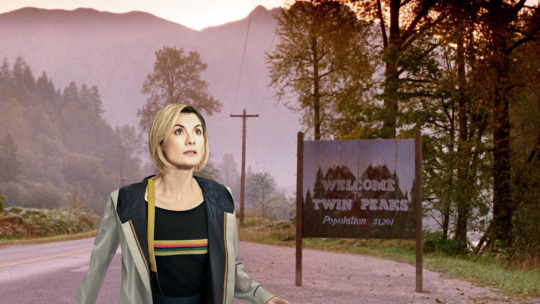
Earlier today, a friend of mine asked me why I chose to do a blog about both Doctor Who and Twin Peaks. He thought it was a very odd pairing. While explaining to him some of my various reasons, I realised that it would actually make a rather interesting article to talk about the similarities between both shows. Believe it or not, there are several. My hope is to possibly garner new interest in either show for Whovians and Peakies alike.
I know a lot of you are here for the Doctor Who content, but I would like to think that a sliver of you are also interested in the Twin Peaks content. That being said, this article will contain some minor spoilers for both Twin Peaks and Doctor Who. Though I will try and maintain the central mystery without giving too much away. I’ve toyed with the idea of writing articles about Twin Peaks outside of episode recaps, but I’ve always shied away for fear of spoilers. Consider yourself warned!
A tale of two pilots
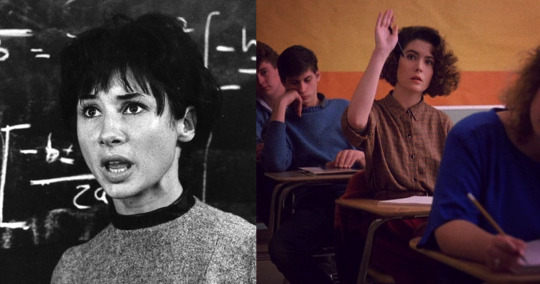
I’ve gone over this in previous blogs that both Twin Peaks and Doctor Who have two separate pilot episodes, albeit for totally different reasons. In the case of Doctor Who, the second pilot was filmed after it was decided that the first one failed to capture the correct tone for the Doctor. Because of this, a reshoot was done, softening the First Doctor’s irascible temper to something more relatable. His cantankerousness was dialled back to rebelliousness, and our protagonist began to feel less like the villain.
In the case of Twin Peaks, the second version of its pilot episode was filmed for the sake of European markets. Having had a rather profitable year, the network ABC was willing to take a gamble on a dark horse in the form of a little project from Mark Frost and David Lynch. However, they only ordered the one episode upfront. Figuring it may never see more than a pilot, an extended version of the episode was filmed to include a conclusion of the story for European markets. While this version of the pilot was not aired in the states, it is widely available on DVD release.
This may seem like a tenuous connection at best. But both of the unused pilots can be viewed as a means to further understand their respective shows. Seeing the Doctor act like a jerk gives a bit of insight into just how far is too far. People may complain that the First Doctor is a cranky old man, but seeing the original pilot of "An Unearthly Child," really illustrates the delicate nature of that balance. Similarly, watching the masterful work of David Lynch’s perfect introduction of Twin Peaks wrap itself up in a clunky, tacked on extra thirty minutes feels just as hollow. People may complain that Twin Peaks leaves too much to mystery, but seeing it end in a shootout makes you appreciate the ambiguity of later episodes. Both pilots prove that sometimes less is more.
Time Off

Both TV shows were cancelled and subsequently brought back to air years later. After 26 seasons of travelling in time and space, Doctor Who had been booted by the head of BBC. After only two seasons Twin Peaks was cancelled by ABC, far before its time. Later, both series attempted a sort of reboot, or revival in the form of movies, both of which were panned by critics. At this point, the only places either show really existed were within the hearts of fans. You may have seen the occasional convention, magazine, or book, but it would appear that both beloved series were dead in the water.
However, it is that very flame kept lit by the fans that gave each series its respective cult status. After years of fans wondering if their favourite shows would get the revivals they so deserved, it would seem their prayers were finally answered. Oddly enough, neither show was a complete reboot, with each acting as a continuation of their original storylines. While each revival has its share of detractors, purists who prefer the original show, overall they were both considered very successful. Much of this is owed to the fact that the creators opted not to be slavishly devoted to the source material, but to instead make something new that still managed to respect the past. Instead of purely playing into nostalgia, they make a case for their own existence by being something new.
Some not so familiar faces

One of Doctor Who’s greatest strengths is that it was able to inject longevity into the show by introducing the concept of regeneration. While most shows die when their actors leave the show, Doctor Who was able to write replacing the actors into the narrative by making it a biological function of the main character. Like Mary’s claim of a virgin birth, its an idea so unique that you can only get away with it the one time. Anyone who replaces their actors in such a way would just be copying Doctor Who, right?
Enter Twin Peaks. Aside from outright replacing actors, as in the case of Donna Hayward in “Twin Peaks: Fire Walk with Me,” David Lynch has taken a rather novel approach to replace actors who have either died or refused to return. Take, for instance, the actor Michael J. Anderson who played “The Man from Another Place,” (or the Arm) in both the series and the movie. After a payment dispute, Anderson claimed that he was “irreplaceable.” And when you consider just how deep his character goes into the mythos of Twin Peaks, it’s hard to disagree. That is, unless you’re David Lynch.
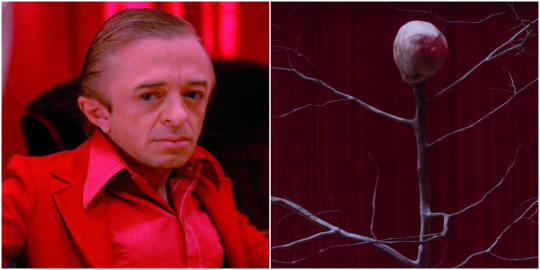
Lynch’s solution to losing Anderson was to simply replace him with a central nervous system/tree with a brain like a wadded piece of chewing gum for a head. And you know what? It actually worked. Referring to it as a sort of “evolution,” the audience needed only to take a moment to bask in the brilliance, and then move on. The same method was used to replace David Bowie with a machine that resembled a tea kettle, or the villainous Bob with a floating black orb containing his face. No actor? No problem.
The surprising fact is that the mythology of both shows was able to sustain what would normally be considered insane narrative choices. As opposed to jumping the shark, these changes actually deepened the mythos of either show. From their conception, both Doctor Who and Twin Peaks are so unique that they have been able to write, and rewrite their own rules.
Relative dimensions in space
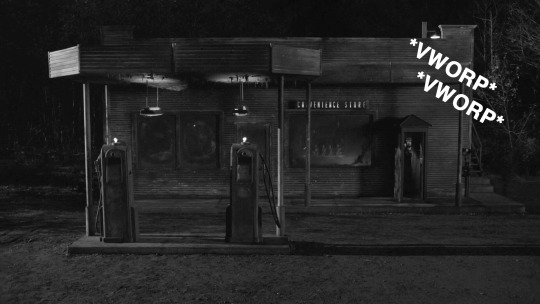
Whether it’s a blue police box that is bigger on the inside or a convenience store that disappears like a TARDIS, neither show seems all that interested in obeying the laws of physics. Physical space is a minor obstacle to be manoeuvred around with an almost godlike technology bordering on magic. We see creatures using otherwise mundane objects to completely sidestep reality. Pictures hanging on walls are portals into entire worlds. Stuccoed buildings act as gateways opening up to boxes floating in space. Portals open deep in the woods to take us into terrifying dimensions that boggle the mind.
Interestingly enough, both shows approach these elements seemingly from opposite ends of the spectrum. With Twin Peaks, what has been hinted at possibly being aliens, may actually be something more spiritual. With Doctor Who, something that is hinted at as spiritual is usually aliens. Regardless, in both instances, matter is simply a plaything of beings far more advanced than we mere mortals.
Time and time again
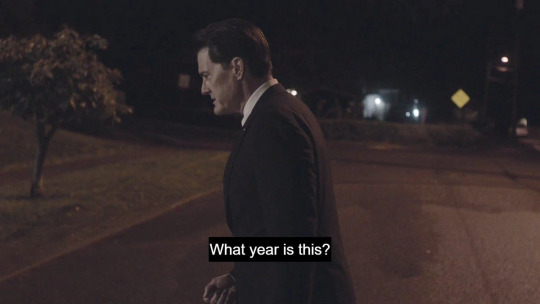
Wibbly wobbly timey wimey stuff isn’t just a thing that affects the Doctor. The heroes of Twin Peaks also experience their fair share of time displacement. Whether it’s a hole punched into the universe by an atomic bomb that imprints the 1940′s onto a dimension visited by Lewis and Clark, or a trip in the TARDIS to the time of Lewis and Clark, both storylines are tangled in a web of timelines threatening the fate of everyone involved.
As we learn with the Doctor, so too do we learn in the case of Dale Cooper that toying with timelines is not an exact science. Distortions happen. Things change. People tend to disappear. Once you cross that threshold, it could all be different. Even with the greatest of plans, our heroes in the fight between good and evil may find themselves in a never-ending battle. At the end of the day, even the best of intentions can be undone by a simple time loop.
They both changed television forever
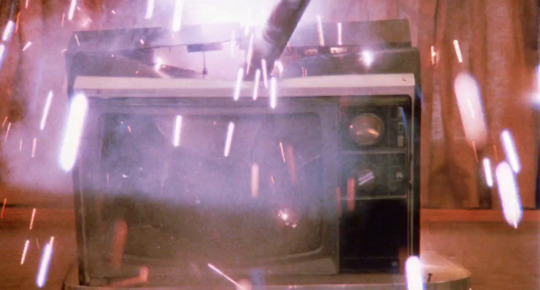
From their very first episodes, both Twin Peaks and Doctor Who aimed to be something different. I’ve said in the past that Doctor Who operates on a level of surrealism rarely seen in science fiction. In a similar manner, Twin Peaks injects a heaping dose of the surreal into both the soap opera and police procedural genres. Because of this, they each come off as incredibly unique stories that stand apart from everything else. Many imitators have come and gone in the years since, but very few have achieved the same degree of success.
These aren’t just lighting in a bottle moments either. The unique nature of either show acts as a response to what came before it. These are deliberate choices to make something different. Sydney Newman’s edict of “no bug-eyed monsters,” while widely ignored, actually speaks to a greater desire to make something of substance. Much in the same way, Twin Peaks exists as a comment on the shallow nature of murder mysteries of the day. Instead of focusing on the murderer, it focused on the victim and how such a crime can destroy a small town.
In their own ways, Twin Peaks and Doctor Who aimed for something deeper. Audiences weren’t just asked to experience terror. Violence was not just a thing to ramp up the tension. Along with the darkness, came a lot of light. The relationships between people were just as important as those between good and evil. Pure joy is a thing to be celebrated, and not scoffed at through pessimistic edgelording. The full spectrum of human emotion is not ignored to service a “clever,” plotline. Even though both shows occasionally lost sight of this principle, they were always at their best when, at their cores, they celebrated life. It is as the Second Doctor said- "There are some corners of the universe which have bred the most terrible things. Things that act against everything we believe in. They must be fought.”
#doctor who#twin peaks#bbc#abc#twin peaks fire walk with me#david lynch#mark frost#thirteenth doctor#an unearthly child#dale cooper#laura palmer#time travel#Time and Time Again#TARDIS#Regeneration#first doctor#sydney newman#verity lambert
8 notes
·
View notes